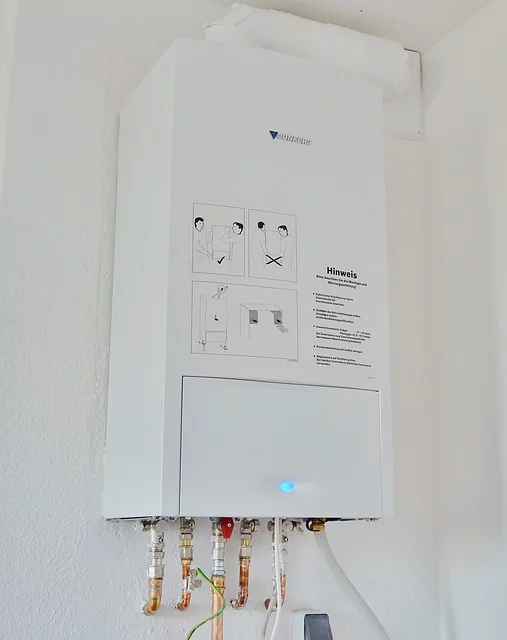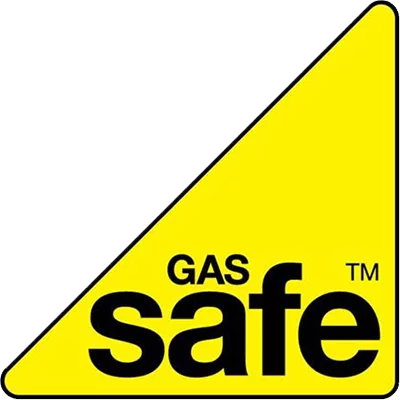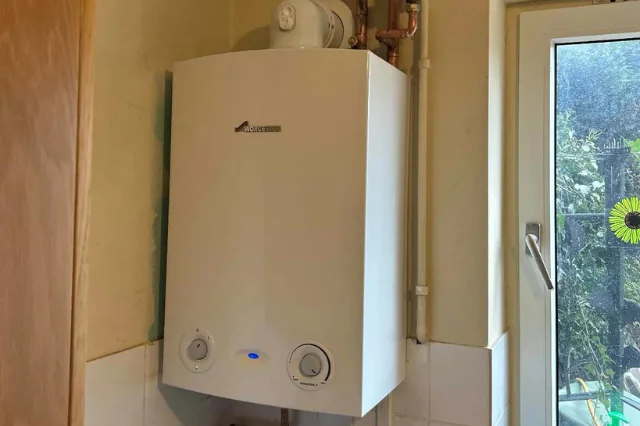Boiler pressure is a bit like blood pressure – too high or too low, and things start going wrong. For combi boilers, the sweet spot is between one and two bar. If the pressure dips below this range, the pump might struggle to distribute hot water to the radiators, particularly those furthest from the boiler.
After bleeding your radiators to remove trapped air, it’s a good idea to check your boiler pressure. If it’s too low, you can increase it by opening the fill valve near the pressure gauge until it reaches 1 to 1.5 bars, then close it. For a combi boiler, you need to switch it off first, then use the filling loop to add water until the pressure gauge shows 1 to 1.5 bars.
After that, close the valves, detach the loop, and restart your boiler. Voila, your boiler should now be back in the pressure sweet spot!
Diverter Valve Malfunction
The diverter valve in a combi boiler works like a traffic cop, directing hot water to either the radiators or taps and showers as needed. This helps to efficiently meet your heating and hot water requirements. But when the diverter valve gets stuck, you’ll find hot water pouring from your taps, but your radiators remain cold.
Identifying a faulty diverter valve can be a bit tricky. If the central heating controls are not working properly, the pressure is correct, but there’s no flow to the radiators, you might have a diverter valve issue. In such cases, it’s best to call in a professional heating engineer who’ll diagnose the problem and fix the issue.
Boiler Pump Failure
The boiler pump is the heart of your central heating system, pumping hot water around your home to keep you warm. But like any hard-working machine, it can start to falter. Signs of pump failure include:
-
Poor heating
-
Strange noises from the boiler
-
Leaks
-
Non-moving or hot shafts indicating a seized pump
-
Cold pipes even when the boiler should be circulating hot water.
If the pump fails to operate due to a lack of power from faulty wiring or a malfunctioning printed circuit board (PCB), you’ll need help from a qualified heating engineer. For issues like a constantly running pump or faulty PCB, professional assistance will be required. And remember, leaks in the boiler pump can result from a variety of issues, such as corrosion, loose connections, or damaged seals, which might require professional repair or a complete pump replacement.
Checking Room Thermostat and Controls
Your room thermostat and controls, acting as the conductor of your central heating system, govern its performance. They tell your boiler when to fire up and send hot water to your radiators. But if they’re not set correctly or malfunctioning, your radiators might remain cold.
Programmable thermostats offer an excellent way to control your heating schedules, potentially lowering fuel bills by turning off heating when not necessary, such as during work hours. Plus, modern smart thermostats even allow you to:
-
Adjust settings remotely
-
Set different schedules for different days of the week
-
Monitor energy usage and make adjustments to save even more money
-
Receive alerts and reminders about maintenance and filter changes
This is perfect for those chilly winter nights when you want to arrive home to a warm house!
Thermostat Settings
Setting your thermostat within the recommended range of 18 to 21 degrees Celsius can make a world of difference to your comfort and energy bills. But remember, the thermostat should be correctly placed, away from heat sources or areas with poor airflow, to ensure accurate temperature readings.
A properly set thermostat is like a well-tuned piano – it hits all the right notes for comfort and efficiency. So make sure it’s turned on, supplied with electricity, and dust-free. For smart thermostats, confirm that the WiFi connection is active and the receiver connected to the boiler is showing an indicator light to signal proper communication. If all else fails, consider replacing an old or malfunctioning thermostat to ensure accurate temperature control.
Central Heating Control Panel
Your central heating control panel is your system’s command center. It’s where you set the timer and hot water settings, controlling when and how much heat your boiler produces. So it’s vital to ensure it’s set correctly to keep your home cozy and your radiators warm.
After power outages or daylight saving time changes, remember to reset the boiler timer to the correct time. Upgrading to a smart or programmable thermostat can save on energy bills by providing better control over heating schedules and the ability to adjust settings remotely. But if your central heating control panel issues persist after trying these troubleshooting steps, don’t hesitate to contact a Gas Safe registered engineer to examine for potential deeper system issues.
Addressing System Blockages and Sludge

There are instances where your boiler and radiators work perfectly yet your central heating system fails to adequately warm your home. The culprit? System blockages and sludge. These pesky issues can cause radiators to be warm only in the middle while leaving the tops and bottoms stone cold.
Sludge forms from untreated water and can create blockages in the system, causing poor performance and cold patches within the radiators. This sludge, technically called magnetite, is denser than water and tends to settle at the bottom of radiators, forming blockages.
So how do you tackle this sticky situation? Let’s find out.
Power Flushing Service
When simple radiator flushing doesn’t cut it, it’s time to bring in the big guns – power flushing. This service is like a high-pressure shower for your central heating system, washing away sludge and blockages.
When individual radiator flushing fails to resolve heating problems, power flushing by professional plumbers might be necessary to address more extensive system blockages. Power flushing should be performed before the installation of a new boiler to ensure the system is free of sludge and debris.
So if your radiators are warm at the top but cold at the bottom, consider availing a power flushing service.
Chemical Cleaning
Chemical cleaning is another potent weapon against the sludge menace. This process involves circulating a mixture of a descaler, a corrosion inhibitor, and a sludge breaker to thoroughly cleanse your central heating system.
The process of cleaning pipes involves the following steps:
-
The chemical mixture is added to the pipes, which dissolves the sludge.
-
The dissolved sludge is then flushed out, leaving the pipes clean.
-
After the cleaning process, a corrosion inhibitor is used to protect the system against future sludge accumulation and corrosion.
This process helps to ensure that water can flow more freely through the pipes and prevents any further issues with sludge buildup.
To keep your system sludge-free, consider performing a chemical flush every 5 to 6 years, which will help maintain your system’s cleanliness and extend your boiler’s lifespan.
When to Call a Professional Heating Engineer
Up until now, we’ve explored various aspects to unravel the mystery of a working boiler with cold radiators. However, there are times when the best course of action is to call in the professionals. If you hear unusual noises in the central heating system, experience a lack of hot water, or face problems specifically related to boiler performance, it’s time to contact a professional heating engineer.
Certified heating engineers, also known as gas engineers, must have industry qualifications and be registered on the Gas Safe Register to legally work on gas appliances. They can ensure the repair is done correctly without causing further damage and can also provide advice on efficient system use to save on energy bills.
Expert Diagnosis
While DIY solutions can handle minor issues, some problems require an expert eye for diagnosis. A Gas Safe registered plumber or heating engineer can accurately diagnose and fix radiator issues, including:
-
Leaking radiators
-
Cold spots on radiators
-
Noisy radiators
-
Radiators not heating up properly
-
Radiators not getting hot at all
A professional heating engineer who’ll address issues before they become severe is crucial for the efficient and safe operation of heating systems. They can offer expert diagnosis and repair services for central heating systems powered by a combination boiler, regular boiler, or mains pressure heating system.
So if you’re still scratching your head over your cold radiators, it might be time to call in the pros, especially when your radiators are cold and not functioning as they should.
Safety and Efficiency
When it comes to heating systems, safety and efficiency should always be your top priorities. That’s why it’s critical to ensure that any professional carrying out boiler maintenance or repairs is Gas Safe registered.
Regular maintenance of the central heating system by a qualified professional offers several benefits, including:
-
Contributing to safety
-
Maintaining the system’s efficiency
-
Keeping heating systems safe and regulation-compliant
-
Minimizing risks such as carbon monoxide leaks
-
Ensuring efficient operation
Professional heating services play a key role in providing these benefits.
Plus, regular servicing by a professional heating engineer can increase your boiler’s efficiency, leading to savings on heating expenses, and extending the overall reliable lifespan of your boiler.
Summary
By now, you should have a clear understanding of why your boiler might be on but your radiators remain cold, and more importantly – what you can do about it. Whether it’s adjusting central heating settings, diagnosing boiler-related problems, checking thermostat controls, addressing system blockages, or calling in a professional heating engineer, you now have the knowledge to tackle your central heating dilemma head-on.
Frequently Asked Questions
Why is my boiler coming on but not heating radiators?
It’s likely that there’s a problem with your boiler pump or central heating controls if your radiators are cold despite the boiler working normally. Consider checking those components for issues.
Why are my radiators hot but my boiler is off?
Your radiators are getting hot because of a failed check valve or a blocked/broken solenoid valve, causing the heat from the boiler to flow to the radiators even when the thermostat is off.
What is power flushing, and when is it necessary?
Power flushing is a high-pressure cleaning process for your central heating system, necessary when individual radiator flushing fails to resolve heating problems. It removes sludge and blockages.
How can I increase the pressure in my boiler?
To increase the pressure in your combi boiler, switch it off, use the filling loop to add water until the pressure gauge shows 1 to 1.5 bars, then restart the boiler. This should help you get the right pressure without any issues!
When should I call a professional heating engineer?
You should call a professional heating engineer if you notice unusual noises, a lack of hot water, or issues with your boiler performance. Don’t hesitate to seek expert help for these issues.



